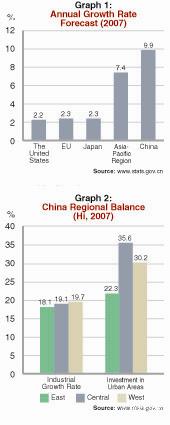|
During the past four years, the urbanization rate increased to 43.9 percent from 40.5 percent and 74.94 million people were transferred to urban areas. The increased urban population has effectively boomed social demands in the sectors of education, medical care, transportation, telecommunications service and food supply, as well as investment in housing and infrastructure construction, which have expanded market capacity. On the other hand, continuous transfer of rural labors to non-farming industries has eased stabilized labor cost and reinforced labor supply for sprawling urbanization.
Economic reform has deepened in the past four years. China's current banking system, with state-owned commercial banks as pillar, has been strengthened, featuring raised capital adequacy ratio, lowered non-performing loans and improved internal governance, which allows them to play a bigger role in distribution of resources. The split-share reform to float non-tradable state shares has activated the capital market by a streamlined financing channel. Strategic adjustments of the national economy and reform on state-owned and state-holding enterprises have generally gained more profits for them by enhanced earning ability. The non-public economy, vigorous as it is, has become an indispensable part to propel development and drive national economy forward.
The world economy has continuously blossomed over the past three decades and has helped bolster China's development, in particular, after its entry into the World Trade Organization. Overall, this year's global economy is forecast at an increase of 5 percent, and China is predicted to be the most dynamic component. (See graph 1)

Quality not quantity
The focus of recent macro control policies has shifted to the optimization of economic structure and evaluation of its effectiveness. Some positive changes have happened since the beginning of 2007 in coordination between different areas, and balance between investment and consumption. In the first six months, total investment in fixed assets grew 25.9 percent over the year earlier period, a decline of 3.9 percentage points in terms of growth rate, while total retail sales of consumer goods rose 15.4 percent, an increase of 2.1 percentage points in terms of growth rate. Overheating investment and sizzling market speculation have been slightly eased.
Industrial growth rate and investment in central and west China surpassed that of comparatively developed eastern regions. (See graph 2)
Public revenue and business profits performed well. The state revenue maintained a growth rate of 20 percent in the past three consecutive years, enabling further macro adjustments backed by stronger financial strength. During the January-May period, profits of state-owned enterprises and non-state enterprises with annual sales exceeding 5 million yuan ($1=7.5723 yuan as of July 31) totaled 902.6 billion yuan, an increase of 267.6 billion yuan or 42.1 percent year on year.
Disposable income per capita in urban areas reached 7,052 yuan, and net cash income per capita of farmers stood at 2,111 yuan. Additionally, the social security network has been strengthened with more and more people included in the endowment, unemployment and medical insurance programs.
Despite an overall increase, excessive trade surplus and liquidity are more outstanding, and investment in fixed assets is likely to bounce back. Inflation pressure is strongly felt on recent surge of food prices. Economic development is too much reliant on energy-consuming and polluting industries. Some deep-rooted problems in the current system and economic structure cannot be fundamentally resolved in the short term. Further regulatory policies on growth mode optimization and full implementation of existing policies should be ensured to keep the national economy on a fast track for healthy development. | 